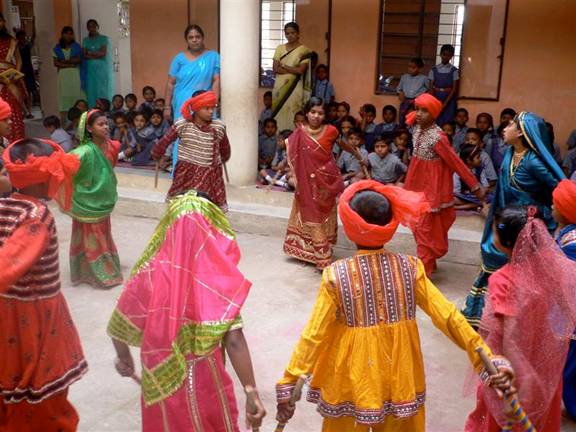Contents:
1. Introduction
1.1 Mission/Vision
1.2 Objective
1.3 Strategy
2. Nav Jeevan current
2.1 Activities of the organisation
2.2 Examples of activities
4. Organisation
4.1 Governance
4.2 Employees
1. Introduction
The Nav Jeevan Foundation aims to provide the foundation (of the same name), which in India is responsible for the implementation of the primary objective realizing a better ("new") life for street children from the slums in Nagpur (a large city in the state of Maharashtra in India) with the necessary financial resources to achieve that objective. In this way we want to achieve a structural improvement in the situation of the poorest people there.
To this end, donations, grants and all other possible sources of fundraising are pursued. Over the past 20 years, with the often targeted support of numerous organizations, the project has been expanded from an orphanage for 10 children to a school for 400 children, who also receive three meals daily and of which about 150 also stay permanently in the hostel that has been built on the same site.
To finance the day-to-day running of the business, an amount of approximately € 14,000 per month is needed (for salaries for teachers and nutrition for the children), which should preferably be achieved as much as possible through fixed contributions from our foundation and the contributions of local government agencies in India. In the years before Covid, approximately € 7,000 was contributed by various agencies in India. Since the Covid period, that is unfortunately only € 2,000 per month. As a result, the Foundation is confronted with increasing concerns regarding obtaining sufficient financial resources.
In any case, this situation has made us realize that our primary focus in the coming years should mainly be on recruiting more (fixed) donations, preferably monthly both in the Netherlands and in India. In addition, we aim for contributions from Dutch funds with a (semi-) permanent character. Finally, we carefully examined all the operational costs of the project and calculated the budget sharply in order to be able to help as many children as possible with as little cost as possible.
1.1 Mission/Vision
Our foundation originated in 2002 when Annelies van de Ven's employer, Calder Holding, indicated that it was looking for a good cause to permanently support. At the time, Annelies herself supported the original orphanage from which she had adopted two of her children in 1980. That charity was quickly determined together and all these years the company has continued to support our foundation through initial contributions and by doubling the donations of its employees.
The trust in the management of the orphanage was immense and has never been betrayed in all those years. From the beginning to all those years of permanent growth of the project.
The drive to give as many street children as possible from the slums in Nagpur a new life is shared by us with the deepest conviction with the leadership in India.
1.2 Objective
Raising funds for the realization of "New Life" (literal translation of Nav Jeevan) for street children from the slums in Nagpur, a large city in the state of Maharashtra in India with the aim of structurally improving the situation for the poorest children there.
1.3 Strategy
In order to achieve this objective, the realization of a school and hostel for the street children was of the utmost importance. Most children are severely malnourished when they come to us. Food and clothing are a first incentive to come to Nav-Jeevan.
In addition to an introduction to the world of reading and writing, they are taught self-respect and dignity at our school. The children receive medical care and a good meal three times a day. They come into a warm, committed, safe environment where they get the chance to lead a happy life and have a view of a better future. Excursions and outings are organized and the holidays of various religions are celebrated with the aim of teaching the children tolerance and understanding of each other's faith.
Investing in education is the most effective and sustainable way of development aid. In our project, the emphasis is therefore on providing good education. We are recognized as a Junior College and have the toddler and kindergarten classes and classes 1 to 10.
In recent years, a large number of children have completed the training with a diploma. We encourage children to continue their studies as much as possible and help them with individual scholarships where possible. In this way we have been able to realize our goal of "new life" for these children.
2. Nav Jeevan current
A lot has been achieved in the past 20 years. In phases, the small, rented orphanage has been transformed into a school for children aged 3-20. The status of Junior College has been acquired with which the children can leave school with a high school diploma and start a further education. At this school, 400 children now enjoy their education every day.
Hunger and the desire for security lead the often in poor and frightening conditions (street) children to our school. In addition to education, we also see providing sufficient meals to these children as our primary task. If necessary, we provide them with medical assistance.
To the children who are completely dependent on themselves, we wanted to offer a roof over their heads. To this end, a hostel has been built next to the school, again in phases, where 150 (out of 400) children now reside permanently. A second building, needed to allow the girls and boys to live separately, a requirement of the Indian government, was recently completed thanks to a contribution from the Afas Foundation.
The growth of the project has been steady. With the latest expansion of the hostel, we think that the optimal size of the project has been realized.
2.1 Activities of the foundation
In the coming years (this plan is for the period 2023-2025) an amount of circa € 14,000 per month will be needed to finance the daily business. The most important items are the salaries for staff (including the teachers) and the nutrition for the children.
The foundation in the Netherlands is primarily concerned with acquiring sufficient resources to cover these costs. Over the past 20 years, it has always been possible to remain cost-effective. We have recently experienced that it takes more effort to find new donors and look for new strategies and inputs in the Netherlands of which inclusion in the Philanthropy Knowledge Base is an example.
2.2 Example of activities
Some examples of recent activities:
- The awarded grant application for the construction of a second hostel on the project in India so that we can house the girls and boys separately, a requirement of the Indian government.
- Applying for various subsidies for sub-goals: meals for the children, layout of the classroom, solar panels, further education for a number of children.
- Inclusion of a donation to the Nav Jeevan foundation as a possibility for the Christmas package of Calder Holding employees
- The realisation of a crowdfunding campaign through Steunactie.nl, the results of which are unfortunately limited.
- The realisation of an extensive interview in the Brabants Dagblad, with which the foundation has acquired extra publicity.
- Finding a platform (Knowledge Centre for Philanthropy) on which we can bring our organisation to the attention of funds.
- Initiating more actions to raise money in India itself by our local people working on the project.
- Discussing the structural funding of our teaching team with organisations that have education as their primary objective.
- Although the involvement, commitment and drive of our treasurer and project initiator Annelies van de Ven will hardly be approachable, an important point of attention is the search for a new board member, preferably with the same or similar motivation, who wants to dedicate himself one hundred percent to the foundation.
3. Future
For the future, we foresee clear positive effects from the inclusion of our organisation in the Philanthropy Knowledge Base. The possibilities of making targeted applications through this medium to the funds also included there will hopefully enable us to continue to meet the financing of the vitally important activities by our parent organisation in India.
Now that the project has reached its optimal size, the contact with funds that want to contribute on a more permanent basis to the financing of training (salaries teachers) and nutrition (eating three times a day for the hostel children) is of great importance. We are working on that.
Of great importance is also a great effort to get the contributions in India itself (especially from the Tribal Department) that were stopped due to corona, back to level, preferably even to see expanded. The Tribal Department (rightly) sets requirements for the quality and scope of the training on our project and on our hostel. In our view, there must therefore be financial contributions in return.
3.1 Dilemma
From next school year (September 2023) the education system will change and the exams will expire after class 10 (high school) and exams can only be taken after class 12 (junior college). Now the tribal department comes with the requirement that only tribals are delivered when we start with Junior College, so an 11th and 12th grade. That means a lot of extra costs. For example, we must have at least two specialisations, science and commerce. Previously, we only had commerce. This means expansion with four (expensive) teachers and in addition to a physics classroom that we already have, the design of a chemistry and a biology classroom, the opening of a deposit of € 12,000 and costs around recognition of education for these years of approximately € 6,000.
We are looking for all options, including the option to stop serving these tribal children. Wat does that with our project (numbers, appearance etc). Of course, it also plays a role that we are actually no longer a school if the children cannot take an exam. In the course of 2023, we will make decisions about this.
The eventual failure to resume contributions by the Tribal Department in India could lead us to reconsider the proudly acquired status of Junior College. No longer being able to educate the children at a later age is such an unpleasant prospect for us, given the results we have achieved in recent years, that we experience this option as extremely undesirable.
We will therefore do our utmost to maintain that status, both through fundraising here in the Netherlands, and through continued pressure on the Tribal Department in India itself.
4. Organisation
Details of the foundation:
Nav-Jeevan Foundation
Contact person: A. van de Ven (treasurer)
Derde Rompert 26 5233 AJ ’s-Hertogenbosch
Phone: 0031 653382577
Email: StichtingNavJeevan@gmail.com
Website: nav-jeevan.web.app
Facebook: www.facebook.com/StichtingNavJeevan/
Chamber of Commerce number: 17150609
Tax number: 816051823
ANBI-status: Yes
Member of Philanthropy Knowledge Centre
4.1 Governance
The board is independent and has an independent chairman. The board members are unpaid.
Chairman: A.H.C. Laumen
Secretary: A.J.M. Verhoeven
Treasurer: A.E.M. van de Ven (also contact person)
Other board members: M.A.H. van de Ven en A.M.J. van de Ven
4.2 Employees
The foundation has no employees. The foundation uses volunteers, for example for the management of the website and the Facebook page, for help with submitting (subsidy) applications and for financial matters.
5. Finance
The foundation itself has no costs (with the exception of a very small annual amount for bank charges). All proceeds are donated to the parent/sister organisation in India where the objective of the project is realised.
The remaining costs in India (after deduction of the part that is realised by income of parents and (government) institutions there) are made available to our foundation here by means of annual figures certified by an accountant and also (unaudited) monthly figures.
On the basis of these figures, the required amount is determined from our foundation.
Currently, the salary costs are approximately € 5,000 per month and the cost of nutrition approximately Є 3,000 per month. The other costs are approximately € 6,000 per month. The total costs per month are therefore approximately € 14,000.
This comes from India itself, after the (temporary) loss of the contribution by the Tribal Department , € 2,000 per month. which they want to increase to € 4,000 in the coming year because of the loss of the contribution from the department.
Based on experiences from the last 20 years through fixed donations and on average incidental contributions by Charities (and other) Foundations, an amount of approximately € 7,000 has been made from the Netherlands, more or less insured. It is still hard work to retain existing donors and find new donors. "Competition" from other charities, inflation and cost increases have an obstructive effect.
In order to avoid further thickening of the activities that are so important, full efforts will have to be made to restore, preferably even expand, the contributions by the Tribal Department in India and to expand the (preferably fixed monthly or annual) donations and by acquiring (semi-) permanent contributions from funds, which mainly focus on funding projects aimed at education and / or nutrition in third world countries / India.
The expansion of donations will mainly have to be realised by giving information and presentations at schools, at associations, business clubs, etc. and by intensifying the crowdfunding campaign, partly through as much media attention as possible for our beautiful project and its tangible results. The appeal of our own website can also be of value.
In order to achieve (additional) contributions from funds, we have started an intensive collaboration with the Philanthropy Knowledge Centre to significantly increase the visibility of our foundation with these funds and to be able to approach targeted funds aimed at the objectives of our project in India.
On our website you will find extensive information about our project, newsletters and annual reports with the financial statements from the start of the project.
January 2023
The Project
The Nav-Jeevan Foundation was founded in December 2002. Nav-Jeevan means New Life. This is exactly what Nav-Jeevan aims at: give the street kids in Nagpur shelter and help them build a new life. They are the children of rag pickers, beggars, brick-bearers and rickshaw drivers. Most of them live in one-parent families and have lost the other parent because of several reasons. They live in slums, left on their own during the long hours when the parent is working. Very often, they are abused by other grown-ups and are exposed to violence when the parent returns home intoxicated (alcohol and/or drugs)
These children have been denied the right to be a child. They do not receive any form of basic education that could help them to escape the spiral of misery. They are doomed to repeat their parents' life unless they get help now.
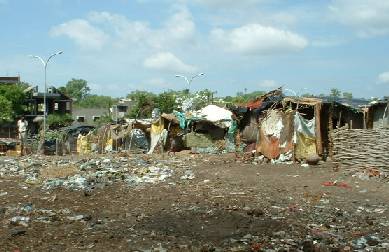
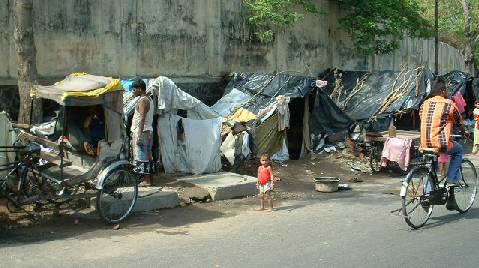
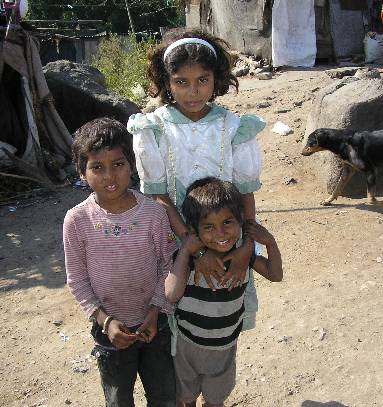
From shelter for 10 children in 2003 to School and Hostel for 400 street children
Nav-Jeevan has made an enormous development in the last 20 years. In January 2003 we started with the project: shelter and education for street children. We started with 10 children in a small rented accommodation. At this time we have grown to a school with almost 400 children, 150 of them are staying in the hostel.
In the school year 2015-2016 we were recognized as High School en we had the classes 1 to 10 (Hindi and English). The children can get their High School diploma with us.
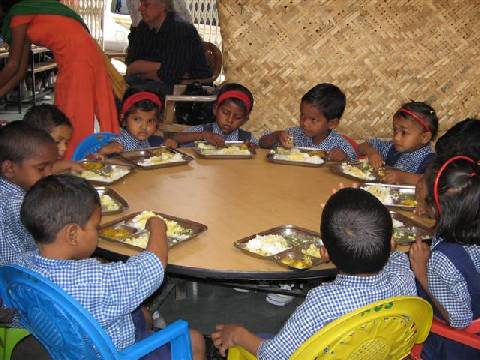
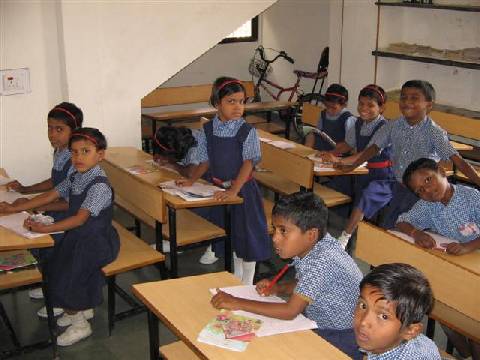
Most children are seriously malnourished when they come to us. Food en clothing are the first incentives to come to Nav-Jeevan.
Apart from getting to know the world of reading and writing they learn about self-respect and dignity.
The children get monthly medical check-ups and when needed medication. They are dancing, singing and playing together. They are happy in their new and safe environment.
We organize picnics, excursions and outings and we celebrate the official holidays of several beliefs in order to teach the children tolerance and understanding for each other's religion.
Besides the volunteers we employ a principal, teachers, wardens, kitchen- and cleaning workers, drivers, a night watchman and a part-time gardener.
The children can look forward to a brighter future. We asked them how Nav-Jeevan has changed their lives. They told us they can now wash themselves every day and learned how to take care of themselves. They love the school because they can learn a lot and they get the time and space to do this.
